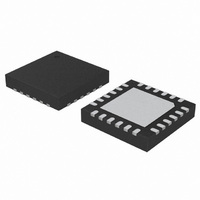C8051F902-GM Silicon Laboratories Inc, C8051F902-GM Datasheet - Page 181

C8051F902-GM
Manufacturer Part Number
C8051F902-GM
Description
IC MCU 8BIT 8KB FLASH 24QFN
Manufacturer
Silicon Laboratories Inc
Series
C8051F9xxr
Specifications of C8051F902-GM
Program Memory Type
FLASH
Program Memory Size
8KB (8K x 8)
Package / Case
24-QFN
Core Processor
8051
Core Size
8-Bit
Speed
25MHz
Connectivity
SMBus (2-Wire/I²C), SPI, UART/USART
Peripherals
Brown-out Detect/Reset, POR, PWM, Temp Sensor, WDT
Number Of I /o
16
Ram Size
768 x 8
Voltage - Supply (vcc/vdd)
0.9 V ~ 3.6 V
Data Converters
A/D 15x10/12b
Oscillator Type
Internal
Operating Temperature
-40°C ~ 85°C
Processor Series
C8051F9x
Core
8051
Data Ram Size
768 B
Interface Type
UART
Maximum Clock Frequency
25 MHz
Number Of Timers
4
Operating Supply Voltage
0.9 V to 3.6 V
Maximum Operating Temperature
+ 85 C
Mounting Style
SMD/SMT
3rd Party Development Tools
PK51, CA51, A51, ULINK2
Development Tools By Supplier
C8051F912DK
Minimum Operating Temperature
- 40 C
On-chip Adc
12 bit
Package
24QFN EP
Device Core
8051
Family Name
C8051F90x
Maximum Speed
25 MHz
Data Bus Width
8 Bit
Number Of Programmable I/os
16
Lead Free Status / RoHS Status
Lead free / RoHS Compliant
Eeprom Size
-
Lead Free Status / Rohs Status
Lead free / RoHS Compliant
Other names
336-1848-5
- Current page: 181 of 318
- Download datasheet (3Mb)
Important Note on External Crystals: Crystal oscillator circuits are quite sensitive to PCB layout. The
crystal should be placed as close as possible to the XTAL pins on the device. The traces should be as
short as possible and shielded with ground plane from any other traces which could introduce noise or
interference.
When using an external crystal, the external oscillator drive circuit must be configured by software for Crys-
tal Oscillator Mode or Crystal Oscillator Mode with divide by 2 stage. The divide by 2 stage ensures that the
clock derived from the external oscillator has a duty cycle of 50%. The External Oscillator Frequency Con-
trol value (XFCN) must also be specified based on the crystal frequency. The selection should be based on
Table 19.1. For example, a 25 MHz crystal requires an XFCN setting of 111b.
When the crystal oscillator is first enabled, the external oscillator valid detector allows software to deter-
mine when the external system clock has stabilized. Switching to the external oscillator before the crystal
oscillator has stabilized can result in unpredictable behavior. The recommended procedure for starting the
crystal is as follows:
XFCN
000
001
010
100
101
011
110
111
1. Configure XTAL1 and XTAL2 for analog I/O and disable the digital output drivers.
2. Configure and enable the external oscillator.
3. Poll for XTLVLD => 1.
4. Switch the system clock to the external oscillator.
Table 19.1. Recommended XFCN Settings for Crystal Mode
155 kHz f 415 kHz
415 kHz f 1.1 MHz
1.1 MHz f 3.1 MHz
3.1 MHz f 8.2 MHz
8.2 MHz f 25 MHz
58 kHz f 155 kHz
20 kHz f 58 kHz
Crystal Frequency
Figure 19.2. 25 MHz External Crystal Example
f 20 kHz
25 MHz
15 pF
15 pF
Rev. 1.0
Bias Current
C8051F91x-C8051F90x
10 Mohm
120 µA
550 µA
2.6 mA
0.5 µA
1.5 µA
4.8 µA
14 µA
40 µA
XTAL1
XTAL2
Typical Supply Current
3.0 µA, f = 32.768 kHz
4.8 µA, f = 32.768 kHz
9.6 µA, f = 32.768 kHz
193 µA, f = 400 kHz
3.9 mA, f = 25 MHz
28 µA, f = 400 kHz
71 µA, f = 400 kHz
940 µA, f = 8 MHz
(VDD = 2.4 V)
181
Related parts for C8051F902-GM
Image
Part Number
Description
Manufacturer
Datasheet
Request
R
Part Number:
Description:
SMD/C°/SINGLE-ENDED OUTPUT SILICON OSCILLATOR
Manufacturer:
Silicon Laboratories Inc
Part Number:
Description:
Manufacturer:
Silicon Laboratories Inc
Datasheet:
Part Number:
Description:
N/A N/A/SI4010 AES KEYFOB DEMO WITH LCD RX
Manufacturer:
Silicon Laboratories Inc
Datasheet:
Part Number:
Description:
N/A N/A/SI4010 SIMPLIFIED KEY FOB DEMO WITH LED RX
Manufacturer:
Silicon Laboratories Inc
Datasheet:
Part Number:
Description:
N/A/-40 TO 85 OC/EZLINK MODULE; F930/4432 HIGH BAND (REV E/B1)
Manufacturer:
Silicon Laboratories Inc
Part Number:
Description:
EZLink Module; F930/4432 Low Band (rev e/B1)
Manufacturer:
Silicon Laboratories Inc
Part Number:
Description:
I°/4460 10 DBM RADIO TEST CARD 434 MHZ
Manufacturer:
Silicon Laboratories Inc
Part Number:
Description:
I°/4461 14 DBM RADIO TEST CARD 868 MHZ
Manufacturer:
Silicon Laboratories Inc
Part Number:
Description:
I°/4463 20 DBM RFSWITCH RADIO TEST CARD 460 MHZ
Manufacturer:
Silicon Laboratories Inc
Part Number:
Description:
I°/4463 20 DBM RADIO TEST CARD 868 MHZ
Manufacturer:
Silicon Laboratories Inc
Part Number:
Description:
I°/4463 27 DBM RADIO TEST CARD 868 MHZ
Manufacturer:
Silicon Laboratories Inc
Part Number:
Description:
I°/4463 SKYWORKS 30 DBM RADIO TEST CARD 915 MHZ
Manufacturer:
Silicon Laboratories Inc
Part Number:
Description:
N/A N/A/-40 TO 85 OC/4463 RFMD 30 DBM RADIO TEST CARD 915 MHZ
Manufacturer:
Silicon Laboratories Inc
Part Number:
Description:
I°/4463 20 DBM RADIO TEST CARD 169 MHZ
Manufacturer:
Silicon Laboratories Inc










